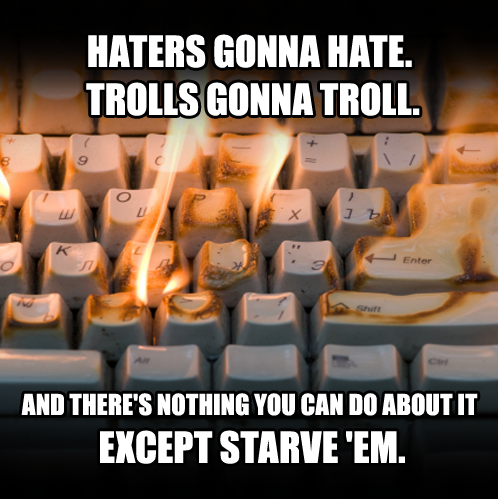Okay, I see more and more trolling everywhere, even people pretending to be me, and it smells fishy.
We all know "don't feed the trolls." Here's a lot of why that's smart and compassionate.
If you want to keep it simple, just remember that "haters gonna hate, and trolls gonna troll," and there's nothing you can do about it except starve 'em.
The broad context is that there are people always looking to feel offended about something. They feel good when they're outraged about something; maybe they feel good only when they're outraged. I don't know about official psychiatric definitions, but as far as I'm concerned, it's addiction.
Jonathan Bernstein, a trusted friend and advisor who is part of the craigconnects team, talks about the "outrage trap." It's a method bad actors use to manufacture an activist group, usually for corrupt purposes. Since there's little factchecking these days, they can make up whatever they want, and there'll be outrage addicts who'll fall for it.
Jonathan says it better, in The Outrage Trap - How You Get Turned into a Dupe by Political and Activist Groups:
"Outrage Trap, A communication containing false information designed to elicit outrage that furthers the purposes of the trap setter."
You might also want to check out Our Addiction to Fake Outrage.
Here's a few reasons you don't want to feed the trolls:
- If the troll is real, at best, they're seeking your attention. If you respond, you're feeding a real unhealthy need, and that encourages their behavior. This is separate from any victimization via an outrage trap.
Some trolls are actually one person or group using many identities, and they're trying to fake consensus and generate activism, or trying to get the troll's prey to say something stupid. I've been doing customer service for over seventeen years, have seen this a lot, and it's getting worse. Trolls will post fake information, and it's not smart to draw attention to it. You might want to post correct information, separately. Trolling, once done, is permanently on the record, and years later may have rather unpleasant repercussions for the troll in terms of employment or liability. If you respond, it might be more discoverable in search engines. In the spirit of forgiveness and compassion, don't make it worse on the troll.I don't have good answers for really dealing with the proliferation of trolling and related disinformation. Some people feel that's becoming so common we're all getting desensitized to it, and I think that's true of Millennials. Unfortunately, people over 30, even trained news professionals, seem more susceptible to outrage traps than younger. We might just have to outwait and survive the trolls, which is no fun at all.
Support HuffPost
Our 2024 Coverage Needs You
Your Loyalty Means The World To Us
At HuffPost, we believe that everyone needs high-quality journalism, but we understand that not everyone can afford to pay for expensive news subscriptions. That is why we are committed to providing deeply reported, carefully fact-checked news that is freely accessible to everyone.
Whether you come to HuffPost for updates on the 2024 presidential race, hard-hitting investigations into critical issues facing our country today, or trending stories that make you laugh, we appreciate you. The truth is, news costs money to produce, and we are proud that we have never put our stories behind an expensive paywall.
Would you join us to help keep our stories free for all? Your contribution of as little as $2 will go a long way.
Can't afford to donate? Support HuffPost by creating a free account and log in while you read.
As Americans head to the polls in 2024, the very future of our country is at stake. At HuffPost, we believe that a free press is critical to creating well-informed voters. That's why our journalism is free for everyone, even though other newsrooms retreat behind expensive paywalls.
Our journalists will continue to cover the twists and turns during this historic presidential election. With your help, we'll bring you hard-hitting investigations, well-researched analysis and timely takes you can't find elsewhere. Reporting in this current political climate is a responsibility we do not take lightly, and we thank you for your support.
Contribute as little as $2 to keep our news free for all.
Can't afford to donate? Support HuffPost by creating a free account and log in while you read.
Dear HuffPost Reader
Thank you for your past contribution to HuffPost. We are sincerely grateful for readers like you who help us ensure that we can keep our journalism free for everyone.
The stakes are high this year, and our 2024 coverage could use continued support. Would you consider becoming a regular HuffPost contributor?
Dear HuffPost Reader
Thank you for your past contribution to HuffPost. We are sincerely grateful for readers like you who help us ensure that we can keep our journalism free for everyone.
The stakes are high this year, and our 2024 coverage could use continued support. If circumstances have changed since you last contributed, we hope you’ll consider contributing to HuffPost once more.
Already contributed? Log in to hide these messages.

